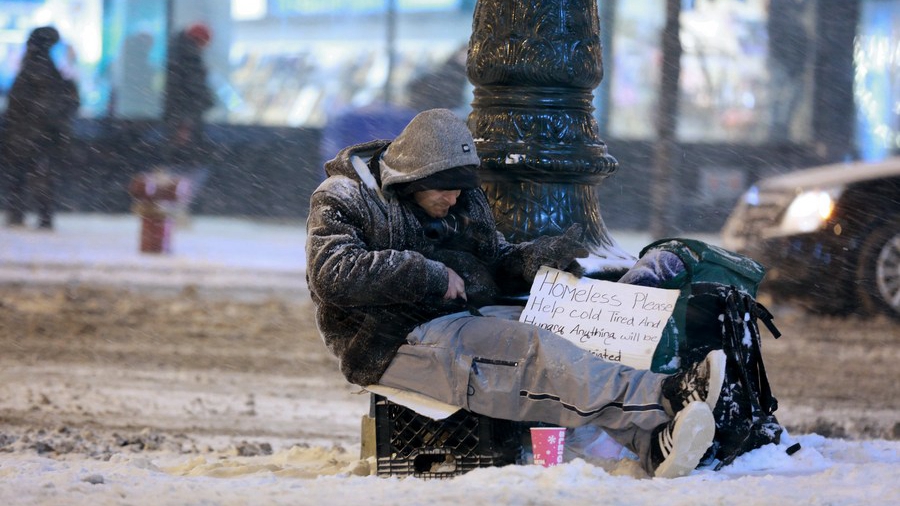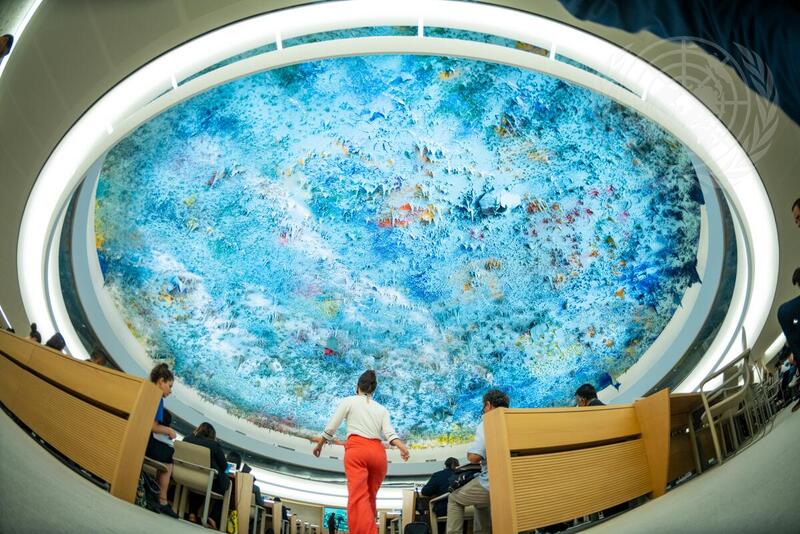
A homeless man sits on the roadside in Chicago, the United States, January 17, 2020. /Xinhua
A homeless man sits on the roadside in Chicago, the United States, January 17, 2020. /Xinhua
Editor's note: Hannan Hussain is a foreign affairs commentator and author. He is a Fulbright recipient at the University of Maryland and a former assistant researcher at the Islamabad Policy Research Institute. The article reflects the author's opinions and not necessarily the views of CGTN.
On June 27, China's representative at the UN Human Rights Council spoke on extreme poverty in a dialogue with the Special Rapporteur, urging the United States to address long-standing problems of sustained poverty in the country. China's firm attention to systemic shortfalls in the U.S. social security system and a dearth of political will strike at the heart of America's mounting poverty challenge.
First, the country's yawning wealth gap and systemic social security inequities all but ensure that certain fundamental rights – such as access to housing and adequate education – remain a mirage for the poor.
It shows in America's deliberate embrace of policies that remove the safety net for millions of marginalized citizens to cater to the rich, and the millions of children that entered poverty after Biden's federal aid dependencies. With such amplifiers of inequality encouraged at the top of the governance latter, increased poverty exposure for the already burdened reveals a nation in denial of its poverty surge.
China's exchange at the council also brought attention to vital specifics on the scale and scope of poverty neglect in the U.S. The reality that over 40 million people actively struggle for basic sustenance takes the lid off U.S. President Joe Biden's narrative of success on the Build Back Better plan's contribution to transforming livelihoods.
Sure, feel good pledges on people's right to economic mobility make frequent features on the federal and state levels in the U.S. But as China's legitimate criticism of America's escalating poverty reveals, the true benefits of reform and development are nowhere near in reach for the millions caught in the throes of destitution.
Other key metrics of America's shambolic state of poverty include its profit-driven healthcare system. The sector fittingly illustrates the "long-standing problems of poverty" in the U.S. with nearly 30 million citizens living without any form of medical insurance. For all the hype about taming high prices in recent times, significant barriers to affording basic treatment plans serve as an amplifier of America's poverty landscape, not a catalyst for improving it.
As a result, select social service sectors leaning towards the rich underscore Beijing's broader point: America's poverty problem shave continued to compound as governance takes exception to people's rights to subsistence, equal development and social security service access.

A wide view of the 50th regular session of the Human Rights Council at the UN headquarters in Geneva, Switzerland, June 13, 2022. /United Nations
A wide view of the 50th regular session of the Human Rights Council at the UN headquarters in Geneva, Switzerland, June 13, 2022. /United Nations
Interestingly, Monday's criticism reveals the split between official U.S. rhetoric on dressing up anti-poverty commitments, and the damning state of the country's social security system. The very thought of a citizen giving up his treatment prospects when the social security net falls short easily debunks what the U.S. celebrates as its commitment to "investing in the well-being of its citizens."
China has paid particular attention to the coronavirus in the U.S. and its role in illuminating America's structural inequities, stands further reinforced by government illusions of a moderate poverty challenge. Consider how past measurements of poverty in the country have conveniently understated the actual number of citizens cut off from basic food, clothing, and housing in the country.
Thus understood, the U.S. must bite the bullet and correct its denial of socioeconomic mobility and poverty relief to its own people. There is no credibility to touting the self-proclaimed strengths of America's social security system when there is little to show for fundamental subsistence for the millions.
The U.S. should spare the world its lectures on basic human rights when it is yet to come to terms with its own systemic neglect of the rights of the poor. A better proposition will be to first prioritize the deep cracks in the American social security system, and end the federal illusion that poverty gains can materialize without political will.
(If you want to contribute and have specific expertise, please contact us at opinions@cgtn.com. Follow @thouse_opinions on Twitter to discover the latest commentaries in the CGTN Opinion Section.)

